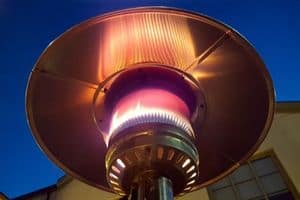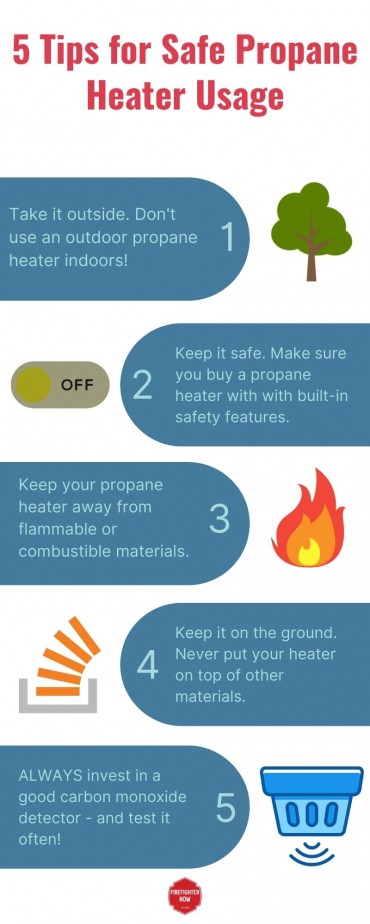For the parts of your home that your HVAC unit cannot reach, a propane heater or two does the trick. You usually run yours on your patio, balcony, or in the garage. Sometimes though, you worry about the risk of carbon monoxide, especially when using the heater in an enclosed space. Do propane heaters produce carbon monoxide?

Propane heaters will release carbon monoxide when in use. Not only do propane heaters produce carbon monoxide, but so do many natural gas and oil-fueled heating systems.
In today’s article, we’ll tell you everything you need to know about using propane heaters and the associated risks. By the time you’re done reading, you can make safer heating decisions for the whole family!
Table of Contents
Can a Propane Heater Release Carbon Monoxide?
A propane heater features a piezoelectric igniter built from durable quartz crystal. Approximate to the igniter is a mechanism with a spring-loaded hammer.
When the igniter receives forced air, it generates electricity. The spark makes the hammer drop, and that’s how the propane heater produces warm air.
Of course, all this is dependent on you having turned the igniter on via the pilot switch.
It sounds pretty straightforward, right? Yet when a propane heater burns, what can happen is incomplete combustion due to insufficient oxygen.
Generally, the ratio of oxygen to propane is under 24:1.
The cause of incomplete combustion can be as simple as a gunked-up burner or even a faulty model.
Regardless, the combustion process can’t play out entirely, and that leads to byproducts such as emissions.
Carbon monoxide is one such emission and carbon dioxide is another. Water, although far less dangerous, is a byproduct of incomplete combustion as well.
Do Propane Heaters Release a Lot of Carbon Monoxide?
If all the parts of your propane burner are working as expected, then there’s a reduced rate of incomplete combustion but never a zero percent chance.
That means that carbon monoxide is always a byproduct of running your propane heater.
The worse off the heater is, such as from burner issues or other malfunctions, then the more carbon monoxide that can flood your garage or patio when you use the propane heater.
It’s one thing if you’re running the heater exclusively outdoors like on a patio or balcony.
Unless you’re in an enclosed outdoor area, the air containing the carbon monoxide usually travels quickly enough that breathing it in wouldn’t cause severe health issues.
However, indoors or in an enclosed space, carbon monoxide can displace oxygen in your body very fast, choking off your brain’s oxygen supply and killing you.
The worst part about carbon monoxide poisoning is that you might not even realize you have it until it’s too late. Carbon monoxide doesn’t have a color, nor does it have a smell or a taste.
It’s just like oxygen. You can’t tell you’re breathing it in until you begin to experience headaches or stomach pain or perhaps dizziness.
It doesn’t matter whether you’re a man, woman, or child or what your health or physical condition is. Without oxygen to the brain, you can die. Carbon monoxide poisoning can kill anyone.
What About Other Types of Gas Heaters? Do They Produce Carbon Monoxide?
We know what you’re probably thinking right now. You can just ditch the propane heater and buy another type of fuel-burning heater instead.
For instance, maybe you can try an oil-burning furnace. You might have heard good things about natural gas. It’s supposed to be a lot cheaper than propane, after all!
Unfortunately, it doesn’t matter if your heater uses oil, propane, natural gas, or any other fuel source.
It’s not the source of the fuel that matters so much as burning the fuel. That’s what leads to carbon monoxide, other emissions, and byproducts.
Tips for Safe Propane Heater Usage
You spent a lot of money on spare propane, and you want to finish your supply before you consider discontinuing the usage of your propane heater. Until then, how can you burn the heater and stay safe?
Here are some usage tips to keep in mind every time you dig out the jug of propane!

Don’t Use an Outdoor Propane Heater Indoors
Propane heaters come in two types, those configured for usage outdoors and those made for usage indoors.
The two types of heaters are not interchangeable and should only be used for the recommended purposes.
To make it clear then, never use an outdoor propane heater indoors. You will flood your home with carbon monoxide.
You also shouldn’t try to use an indoor propane heater outdoors, as the heater is simply not rated for that kind of activity.
Buy a Propane Heater with Safety Features
The best propane heaters are designed with your safety in mind.
The heater might include features such as automatic shutoff, overheat protection, and a low oxygen sensor. The latter especially is important when it comes to staying safe from carbon monoxide.
Keep Your Propane Heater Away from Combustible Materials
This goes for whether you use an indoor or outdoor propane heater. Move the heater so it’s nowhere in the vicinity of flammable items such as towels, bedding, doors, curtains, and furniture.
Leave the Propane Heater Unobstructed
Your propane heater is not a shelf or a perch. Don’t ever place any item on top of the heater for any length of time. You could start a fire!
Buy a Carbon Monoxide Detector
A carbon monoxide detector is a life-saving device and something you should already have in your home anyway.
Now that you’ll use your propane heater to keep you toasty, you especially need a carbon monoxide detector.
If you’ve had one for a while, check the batteries. You should replace them every six to 12 months, so yours are probably overdue. A carbon monoxide detector that doesn’t work is just as good as not having one!
Propane heaters produce carbon monoxide at varying levels. Even if the burners of your heater aren’t clogged, the heater will produce some carbon monoxide.
Since carbon monoxide kills, it’s not a gas you want to mess around with. Use your propane heater for its rated activity (indoor versus outdoor usage) and buy a carbon monoxide detector. Good luck!